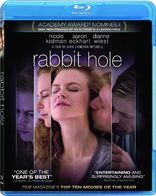Rabbit Hole Blu-ray Movie
HomeRabbit Hole Blu-ray Movie 
Lionsgate Films | 2010 | 91 min | Rated PG-13 | Apr 19, 2011Movie rating
7.1 | / 10 |
Blu-ray rating
| Users | 4.5 | |
| Reviewer | 4.0 | |
| Overall | 4.0 |
Overview
Rabbit Hole (2010)
The Corbett's are a happily married couple whose perfect world is forever changed when their young son, Danny, is killed in an accident. Ms Corbett tries to redefine her existence only to find solace in a mysterious relationship with a troubled young comic-book artist. Her fixation with him pulls her away from memories of her son, while Mr Corbett immerses himself in the past, seeking refuge in outsiders who offer him something Becca is unable to give. The Corbetts, both adrift, make surprising and dangerous choices as they choose the path that will determine their fate.
Starring: Nicole Kidman, Aaron Eckhart, Dianne Wiest, Miles Teller, Tammy BlanchardDirector: John Cameron Mitchell
| Drama | 100% |
Specifications
Video
Video codec: MPEG-4 AVC
Video resolution: 1080p
Aspect ratio: 1.78:1
Original aspect ratio: 1.85:1
Audio
English: DTS-HD Master Audio 7.1
Subtitles
English, Spanish
Discs
50GB Blu-ray Disc
Single disc (1 BD)
Playback
Region A (locked)
Review
Rating summary
| Movie | 4.0 | |
| Video | 4.0 | |
| Audio | 4.0 | |
| Extras | 3.0 | |
| Overall | 4.0 |
Rabbit Hole Blu-ray Movie Review
Every parent's worst nightmare.
Reviewed by Jeffrey Kauffman April 2, 2011Those of you reading this who are parents know exactly how much your lives changed when your children were born. Along with the sleepless nights of infanthood, the teething, the temper tantrums, the refusal to eat vegetables, along with the everyday ins and outs of managing your own personal “mini-me”, there’s an undeniable truth underlying every moment of your interaction with your progeny: you’re scared to death something bad might happen to them. Thus the rubber coverings on sharp corners, the plug protectors in all the sockets, the gates on the stairs, and other accoutrements of incipient parenthood. But even deeper, and cast probably more in a layer of protective denial than these shallower fears, is the dreaded awareness of mortality, of the outright frightening fact that worst case scenarios might involve the death of your child. You see the horrifying articles in the newspaper or on the evening news of children ripped from the living by car crashes, unexpected illnesses and other vagaries of fate that have left other parents in emotional bankruptcy. You pray the same thing never happens to you. Even more than with your spouse, you suddenly realize that in a very real way you would trade your own life to protect the lives of your offspring. It’s something that those without children can’t fully understand, but it’s a bond of fear and responsibility (mixed of course with overwhelming love) that unites all parents. And it’s that bond, now frayed perhaps beyond repair, that is at the heart of Rabbit Hole, the small scale indie film based on a Pulitzer Prize winning play by David Linday-Abaire (who adapted his play for this film version) which brought Nicole Kidman her most recent Academy Award nomination. A quiet but often devastating meditation on the after effects of the loss of a child, Rabbit Hole isn’t showy or overly histrionic, but in that very tamped down ethos it explores a wealth of emotional responses to an overwhelming tragedy.
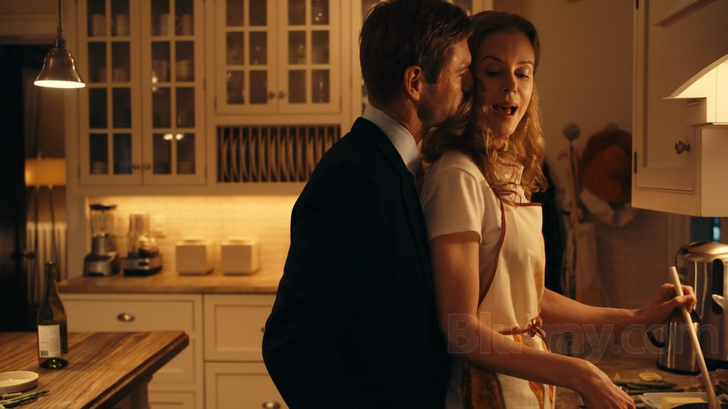
Becca (Kidman) and Howie (Aaron Eckhart) are living what appears to be a picture perfect life in some undefined but incredibly sylvan and rather tony suburb of New York. Becca tends to her flower garden, makes risotto for Howie, and the two seem at least to be the very model of a happily married middle aged couple. And yet there’s undeniably something wrong here from the very beginning. The two touch but never quite connect. Their timing is off. It’s like there’s a slight ripple in the time-space continuum between them and they can’t quite overcome the breach. Slowly, in one of many sleights of hand of Lindsay-Abaire’s remarkable writing, we come to realize they have lost their four year old son Danny to one of those horrible accidents other parents quickly skim over when they see the news articles in the morning papers, pausing just long enough to emit a perfunctory “There but for the grace of God. . .”
The two move through their days with a decent amount of intelligence and even grace, and it’s obvious neither has lost their sense of humor. They go to a weekly group of other bereaved parents where Becca hates the “God talk” and upbraids some semi-hysterical parents who says God must have wanted another angel when He took their child. “Why didn’t he just make an angel?” Becca asks incredulously. “I mean, He’s God—you know, ‘poof’!” Needless to say the rest of the parents stare incredulously at her and Becca and Howie beat a quick retreat. The emotional management these two display is obviously fracturing beneath the steely, picture perfect surfaces.
Rabbit Hole really reaches into its devastating emotional depths in a brilliantly constructed middle section which finds Becca perhaps stalking a teenaged boy. Does she imagine this young man is what Danny might have been had he lived? When she follows the kid into the library and sees he has checked out a book on “Parallel Universes,” it seems to open an imaginative window in Becca’s soul where perhaps she can imagine another outcome for her life. But the real reason for her interest in this boy is wrenching and delivers one of Rabbit Hole’s most unexpected gut punches, one which reveals the real majesty of Lindsay-Abaire’s discursive approach to this subject, a subject which in a lesser writer’s hands might be fraught with too much pathos and melancholy. Lindsay-Abaire walks a high wire act here which is simply amazing, able to peel back Becca’s façade to reveal the “wounded warrior” underneath, while never devolving into mere hysteria or showy theatrics.
Perhaps the most surprising thing about Rabbit Hole is that it is directed in rather amazingly low key style by John Cameron Mitchell, the creator and director of Hedwig and the Angry Inch. Both Hedwig and Mitchell’s previous film Shortbus skirted (and sometimes more than merely skirted) around the edges of sexual adventurousness, looking at issues like gender identity, promiscuity and societal inhibitions about various taboos. Mitchell would not seem on his face to be the right choice for such introspective, emotional material, but he does exceptional work here, despite an odd penchant for framing shots from within various structures like mailboxes and other containers. He elicits incredibly fine performances from Kidman and Eckhart, as well as a uniformly excellent supporting cast which includes Tammy Blanchard as Becca’s ne’er-do-well sister Izzy and Dianne Weist as the girls’ mother, a salty woman who suffered her own familial tragedy years earlier.
Rabbit Hole is an intentionally quiet film which erupts into two or three blustery scenes as Becca and Howie attempt to forge their way through this new childless territory. They move in fits and starts, but their essential commitment to each other, despite some temporary wanderings, is what anchors the film in its very real emotional sensibility. The film may strike some as too slow and plotless, but this is a story which reveals itself calmly and deliberately, coming face to face with an unimaginable truth that is certainly every parent’s worst nightmare. The fact that these two characters have had the courage to wake up, however disheveled, is what gives Rabbit Hole its distinctive emotional immediacy. Surprisingly, this is not an overly depressing film, even for parents who might not want to watch it simply by dint of its subject matter. It’s not especially triumphant, either, in a blaring, trumpets to the sky way. But there is a quieter victory hinted at in the simple fact of two people who finally do connect when they touch.
Rabbit Hole Blu-ray Movie, Video Quality 
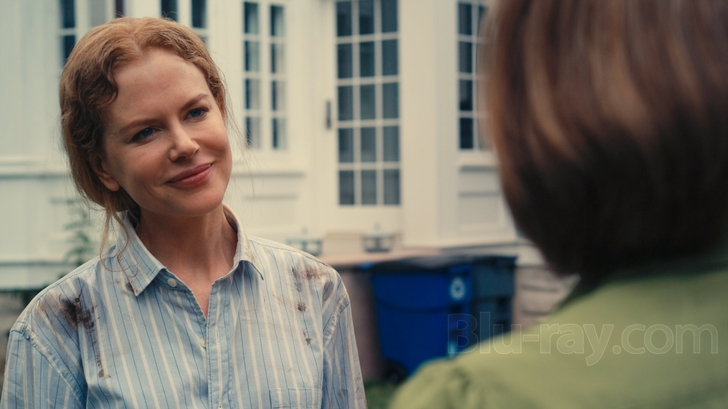
All but the last sequence of Rabbit Hole was filmed with the digital Red camera, and so the texture of this AVC encoded 1080p transfer (in 2.35:1) may strike some as overly "video" looking, despite Mitchell and DP DeMarco's insistence that's there as much detail in this hi-def video format as with traditional film. What's instantly apparent is a "smoother" look (for wont of a better term) than traditional film stock, with a relative lack of grain. Colors are just slightly desaturated here, perhaps by design, giving the film a less than robust appearance some of the time. In fact it's notable that the last sequence of the movie, which was filmed with a traditional 35mm camera, boasts noticeably more "peachy" (to quote DeMarco) hues, and a much deeper looking texture. All of this said, clarity, sharpness and detail are excellent throughout this enterprise, though midrange shots suffer from occasional softness and there are some passing issues with aliasing on some closeknit costumes and some outdoor shots of leaves.
Rabbit Hole Blu-ray Movie, Audio Quality 
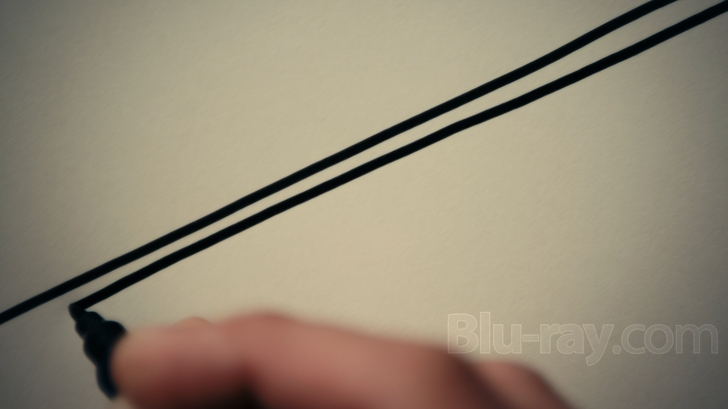
It seems positively odd that a quiet film like Rabbit Hole should be granted a lossless DTS-HD Master Audio 7.1 mix. It's even more odd when this film doesn't really exploit, or in fact need to exploit, the surround channels. This is a small scale, dialogue driven film, and as such, the surround channels typically come into play courtesy of the minimal underscore and some passing ambient environmental sounds. In fact the only really immersive moments in this film are in noisier crowd scenes, as when Becca ventures into New York City or in the family scene at the bowling alley. There's certainly nothing wrong with this track by any stretch of the imagination; it presents everything cleanly and clearly and effects, dialogue and score are all artfully mixed and well positioned around the soundfield. It just seems like a bit of sonic overkill, at least theoretically speaking, especially when there isn't that much opportunity for surround channel utilization to begin with.
Rabbit Hole Blu-ray Movie, Special Features and Extras 
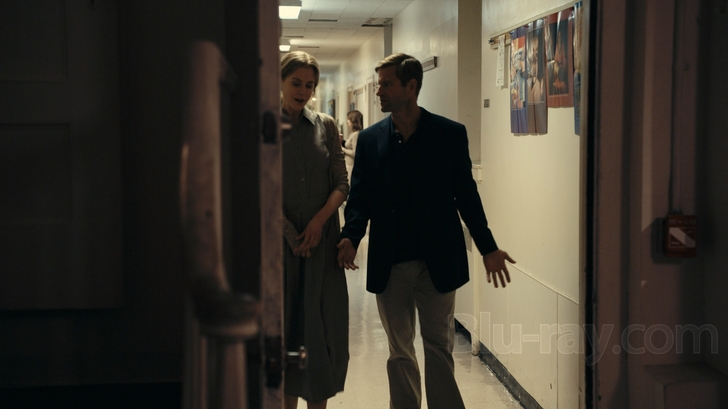
- Commentary by director John Cameron Mitchell, original playwright and scenarist David Lindsay-Abaire and director of photography Frank De Marco. While rather low key, this is nonetheless very interesting stuff, and includes both personal stories (Lindsay-Abaire had been urged by a Juilliard professor to write about what frightened him the most), as well as technical aspects of the filming (which was mostly done on with a digital Red camera).
- Deleted Scenes (HD; 3:07) actually presents some alternate scenes, including a rather interestingly different confrontation in the supermarket sequence.
- Trailer
Rabbit Hole Blu-ray Movie, Overall Score and Recommendation 
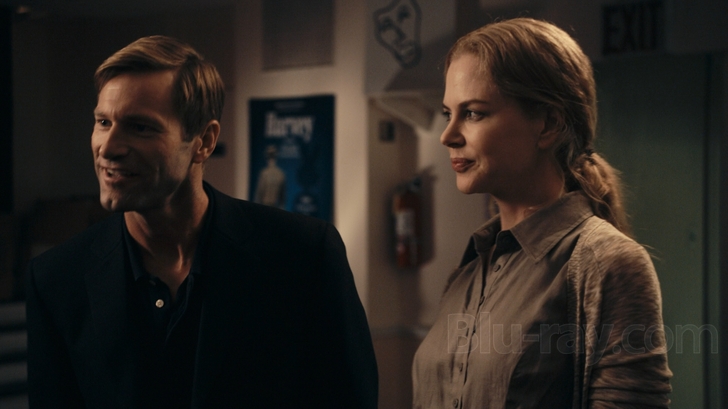
As a parent myself, and one who is not ashamed to admit that, yes, I have the very fears talked about in this review, I dreaded having to watch Rabbit Hole. Imagine my surprise, then, at watching a film that doesn't wallow in sorrow or pathos, and in fact delivers a couple of hearty laughs along the way. Kidman is simply fantastic in this role, and she's matched every step of the way by the stellar supporting cast. The film is unexpectedly artfully directed by John Cameron Mitchell, and, though dealing with a relatively smaller scale, Rabbit Hole hits some very big emotional moments flawlessly. Highly recommended.
Similar titles
Similar titles you might also like

Collateral Beauty 4K
CANCELLED
2016

Demolition
2015

The Innocents
Les Innocentes
2016

Shock and Awe
2017

Cake
2014

Last Flag Flying
2017

Waves
2019

Alice, Darling
2022

Breathe In
2013

The Diary of a Teenage Girl
2015

Strangerland
2015

The Light Between Oceans
2016

American Pastoral
2016

The Goldfinch
2019

20th Century Women
2016

Same Kind of Different as Me
2017

The Visitor
2007

The Fabelmans 4K
2022

Reign Over Me
2007

American Woman
2018
